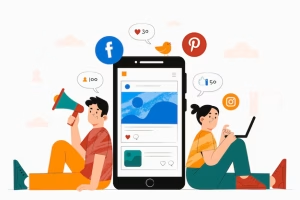Key Points
- Targeted Digital Channels Drive Results: SEO, PPC, and social media precisely reach individuals seeking addiction treatment, maximizing lead quality.
- Empathy Builds Trust: Compassionate, ethical marketing resonates with vulnerable audiences, fostering connections that convert leads into admissions.
- Local SEO Boosts Visibility: Optimizing Google Business Profiles and local listings attracts nearby clients, filling beds efficiently.
- Content Marketing Establishes Authority: Engaging blogs, videos, and success stories educate audiences, positioning centers as trusted recovery resources.
- Data-Driven Strategies Optimize ROI: Call tracking and CRM systems refine campaigns, ensuring budgets target high-intent leads effectively.
Introduction
Drug rehab lead generation is critical for addiction treatment centers aiming to connect with individuals needing help. The stakes are high—empty beds mean missed opportunities to save lives. Effective strategies blend empathy, precision, and technology to attract high-quality leads. Clear Path Treatment Solutions specializes in crafting tailored digital marketing plans for rehab centers. This article explores proven methods to generate leads, build trust, and drive admissions ethically and efficiently.
Understanding the Audience
Successful lead generation starts with knowing who your leads are. Addicted individuals and their families seek immediate, compassionate support. They often search online for local treatment options, driven by urgency and hope. Creating detailed customer personas guides marketing efforts. These personas include demographics, behaviors, and pain points, ensuring campaigns resonate deeply. For example, a persona might be a 30-year-old struggling with opioid addiction, searching for nearby centers offering medication-assisted treatment. Understanding these needs shapes targeted strategies.
Search Engine Optimization (SEO)
SEO is a cornerstone of drug rehab lead generation. It boosts organic visibility on search engines like Google. A strong keyword strategy targets terms like “drug rehab near me” or “addiction treatment options.” Optimizing website content, headers, and meta descriptions increases rankings. Local SEO is vital for rehab centers serving specific communities. Claiming and optimizing Google Business Profiles ensures visibility in local searches. Encouraging positive client reviews enhances credibility, while consistent business information across platforms strengthens trust. SEO drives high-intent traffic directly to your website.
Pay-Per-Click (PPC) Advertising
PPC ads offer instant exposure for rehab centers. Platforms like Google Ads allow precise targeting of individuals searching for treatment. Ads can focus on specific addictions, such as alcohol or opioids, and geographic areas. Crafting compelling ad copy with clear calls-to-action is essential. For instance, an ad might read, “Find Hope Today: Local Drug Rehab.” PPC campaigns must comply with strict regulations, like Google’s addiction ad policies, to avoid penalties. Clear Path Treatment Solutions ensures compliant, high-performing ads that lower cost-per-acquisition.
Content Marketing
Content marketing builds trust and authority. Blogs, videos, and infographics educate audiences about addiction and recovery. Topics like “Signs of Opioid Addiction” or “What to Expect in Rehab” address common concerns. Sharing client success stories (with consent) humanizes your brand, inspiring hope. Content must be empathetic, avoiding stigma or judgment. Optimizing content with keywords boosts SEO, driving organic traffic. Regularly updating blogs keeps your site relevant, encouraging repeat visits and inquiries.
Social Media Marketing
Social media platforms like Facebook, Instagram, and LinkedIn offer unique opportunities. Instagram’s visual storytelling is ideal for sharing recovery stories or facility tours. LinkedIn targets professionals for referral networks. Paid social ads allow precise demographic and behavioral targeting. For example, ads can reach adults aged 25-45 in a specific city who’ve shown interest in addiction resources. Engaging posts, like inspirational quotes or treatment tips, foster community and trust. Responding to comments and messages promptly builds meaningful connections.
Email Marketing
Email marketing nurtures leads who’ve shown interest. Personalized newsletters keep your center top-of-mind. For instance, a lead who downloads an eBook on recovery options receives tailored follow-ups. Subject lines like “Your Path to Recovery Starts Here” grab attention. Emails should offer value, such as treatment insights or free consultations, not just sales pitches. Compliance with HIPAA and anti-spam laws is critical. Automation tools streamline campaigns, ensuring timely, relevant communication that drives conversions.
Call Tracking and Analytics
Call tracking provides insights into lead sources and campaign performance. By analyzing which channels—PPC, SEO, or social—generate the most calls, centers optimize budgets. Tracking call quality helps distinguish serious inquiries from casual ones. For example, a call from someone asking about detox programs is more valuable than a general inquiry. Analytics tools measure ROI, guiding data-driven decisions. Clear Path Treatment Solutions uses advanced tracking to refine strategies, ensuring every dollar spent maximizes admissions.
Customer Relationship Management (CRM) Systems
CRM systems streamline lead management. They track interactions, score leads based on engagement, and prioritize high-intent prospects. For instance, a lead who visits multiple website pages and submits a contact form is flagged for immediate follow-up. CRMs integrate with email and call tracking, creating a cohesive strategy. They also improve patient care by storing preferences and concerns, enabling personalized communication. Efficient CRM use reduces wasted time on unqualified leads, boosting conversion rates.
Local Outreach and Partnerships
Local outreach complements digital efforts. Partnering with community organizations, like churches or schools, raises awareness. Hosting workshops or support groups positions your center as a trusted resource. For example, a seminar on addiction prevention can attract families seeking help. These efforts generate referrals and strengthen community ties. Optimizing local directory listings, like Yelp or Healthgrades, enhances visibility. Ethical outreach avoids exploitative tactics, focusing on genuine support for those in need.
Ethical Considerations
Ethical marketing is non-negotiable in addiction treatment. Patient brokering—selling leads for kickbacks—is illegal and harmful. Marketing must prioritize patient well-being, avoiding manipulative tactics. Transparency about treatment processes and costs builds trust. HIPAA compliance protects patient privacy, ensuring secure data handling. Clear Path Treatment Solutions emphasizes ethical strategies, aligning campaigns with regulatory standards and compassionate care principles. Ethical marketing not only complies with laws but also resonates with audiences seeking genuine help.
Measuring and Optimizing Success
Continuous monitoring ensures strategies remain effective. Key metrics include website traffic, conversion rates, and cost-per-lead. A/B testing ad copy or landing pages identifies what resonates best. For instance, testing two PPC ads with different headlines reveals which drives more clicks. Adjusting budgets toward high-performing channels maximizes ROI. Regular audits of SEO and content performance keep strategies aligned with goals. Data-driven optimization ensures a steady flow of qualified leads, supporting long-term growth.
Conclusion
Drug rehab lead generation requires a multifaceted approach. SEO, PPC, content, and social media drive targeted traffic, while email and CRM systems nurture leads. Local outreach and ethical practices build trust, essential for connecting with vulnerable audiences. Clear Path Treatment Solutions crafts customized, data-driven strategies to fill beds and transform lives. By blending empathy with precision, rehab centers can attract high-quality leads and achieve sustainable success. Start implementing these strategies today to make a meaningful impact.
FAQs
Why is local SEO important for rehab centers?
Local SEO targets nearby clients, boosting visibility in searches like “rehab near me,” driving high-intent leads.
How does content marketing help generate leads?
Educational content builds trust, addresses concerns, and establishes authority, encouraging prospects to contact your center.
Are PPC ads effective for drug rehab marketing?
Yes, PPC ads deliver instant exposure, targeting specific audiences with compliant, high-converting campaigns.
What role does empathy play in lead generation?
Empathetic marketing resonates with vulnerable audiences, fostering trust and increasing the likelihood of conversions.
How can CRM systems improve lead management?
CRMs track interactions, prioritize high-intent leads, and personalize communication, streamlining conversions and improving efficiency.
Sources
SAMHSA (Substance Abuse and Mental Health Services Administration): https://www.samhsa.gov
LegitScript: https://www.legitscript.com





